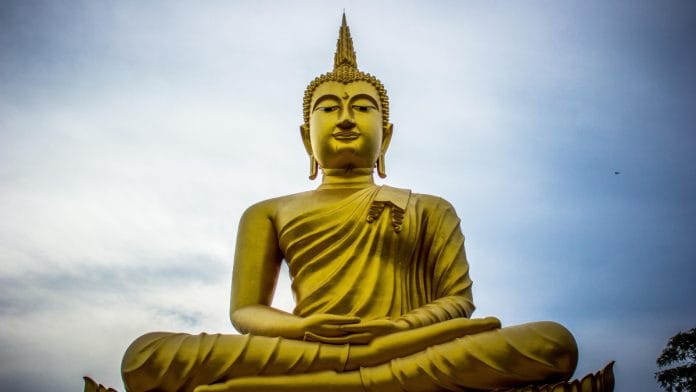Thank you dear subscribers, we are overwhelmed with your response.
Introduction
In the vast tapestry of Hindu philosophy and spirituality, there are intricate concepts that require a discerning eye to differentiate. Among these, “Buddha” and “Buddhatva” may initially appear similar, but they hold distinct meanings and play a significant role in the spiritual realm. Via this article am trying to explore the contrasting essence of Buddha and Buddhatva, shedding light on their individual significance and their broader implications within Hindu spirituality.
Buddha: The Enlightened One
Buddha, with a capital “B,” primarily refers to Siddhartha Gautama, also known as Lord Buddha. He was the founder of Buddhism—a religion that originated in ancient India around the 6th century BCE. The term “Buddha” translates to “the enlightened one” or “the awakened one.” Lord Buddha attained enlightenment under the Bodhi tree, transcending the cycle of suffering and rebirth. Central to his teachings are the Four Noble Truths and the Eightfold Path, which form the core of Buddhism, emphasizing the cessation of suffering and the attainment of Nirvana.
Buddhatva: The Essence of Enlightenment
In contrast, Buddhatva, denoted with a small “b,” encompasses a broader philosophical concept within Hinduism. It signifies the essence of enlightenment—the state of awakening that surpasses worldly suffering. Buddhatva is not confined to any particular individual; rather, it represents the potential within every sentient being to attain spiritual enlightenment and realization.
In Hinduism, Buddhatva finds association with the concept of “Atman,” which refers to the inner self. Buddhatva signifies the realization of one’s true nature, which is inherently divine and eternal. This realization leads to a state of inner peace, wisdom, and liberation from the cycle of birth and death, known as Samsara.
Key Differences between Buddha and Buddhatva
To better understand the distinction between Buddha and Buddhatva, let us delve into their key differences:
Individual vs. Universal
Buddha refers to the historical figure Siddhartha Gautama, while Buddhatva is a universal concept applicable to all beings. Buddha represents a specific individual who achieved enlightenment, whereas Buddhatva represents the potential for enlightenment inherent in every sentient being.
Religion vs. Philosophy
Buddhism is a distinct religion with its own set of beliefs and practices, whereas Buddhatva is a philosophical concept that can be integrated into various spiritual paths, including Hinduism. While Buddhism revolves around the teachings and practices of Lord Buddha, Buddhatva encompasses a broader spectrum of spiritual beliefs and practices within Hinduism.
Understanding the role of Buddhism in shaping cultural identities can provide deeper insights into the spiritual landscape of South Asia.
Path to Enlightenment
Buddha’s enlightenment is specific to his own journey and teachings. On the other hand, Buddhatva represents the potential for enlightenment present in all beings, offering a broader spiritual perspective. While Lord Buddha’s teachings provide valuable insights into the nature of suffering and the path to Nirvana, Buddhatva in Hinduism encompasses diverse spiritual practices and beliefs.
Significance of Buddha and Buddhatva in Hindu Spirituality
Within the realm of Hindu spirituality, both Buddha and Buddhatva hold profound significance, albeit in different ways.
Buddha’s Significance
Lord Buddha, as the founder of Buddhism, plays an essential role in Hindu spirituality. His teachings provide valuable insights into the nature of suffering and the path to liberation. Even within Hinduism, Lord Buddha is revered as a great spiritual teacher, guiding seekers towards the cessation of suffering and the attainment of enlightenment. His teachings offer a unique perspective on the nature of reality and the human condition.
Buddhatva’s Significance
Buddhatva serves as a reminder of the divine essence within each individual. It encapsulates the potential for enlightenment and self-realization that exists within all sentient beings. Buddhatva encourages seekers to embark on a path of self-discovery, ultimately leading to spiritual enlightenment and liberation from the cycle of rebirth. It emphasizes the innate divinity and eternal nature of the self, fostering inner peace, wisdom, and self-realization.
The Essence of Enlightenment: A Philosophical Journey
Buddhism and Hinduism, while distinct in their approaches, share a common thread in their pursuit of enlightenment. Both traditions recognize the significance of transcending suffering and attaining a state of inner awakening. However, they diverge in their emphasis on the individual and the universal.
Buddha, as a historical figure and the founder of Buddhism, embodies a specific path to enlightenment. His teachings provide a roadmap for practitioners to follow, guiding them towards the cessation of suffering and the attainment of Nirvana.
On the other hand, Buddhatva, as a broader concept within Hinduism, embraces the universal potential for enlightenment. It acknowledges that every sentient being possesses the inherent capacity to realize their true nature and attain spiritual liberation. Buddhatva encourages seekers to explore diverse spiritual practices and philosophies within Hinduism, all aimed at self-realization and the ultimate union with the divine.
As seekers of truth and enlightenment, it is important to recognize and appreciate the diverse paths available to us. Whether we resonate with the teachings of Lord Buddha or embrace the concept of Buddhatva within Hinduism, the ultimate goal remains the same – to transcend suffering, realize our true nature, and attain spiritual liberation. May our exploration of these profound concepts inspire us to embark on a transformative journey towards inner awakening and self-realization.


